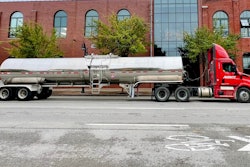Truck drivers convicted of disqualifying offenses while driving non-commercial motor vehicles will not lose their commercial driver’s licenses unless the conviction resulted in loss of non-commercial driving privileges. As written, a Federal Motor Carrier Safety Administration rule published in July could have mandated the revocation of a CDL for drug- and alcohol-related traffic convictions even if the state didn’t suspend or revoke the truck driver’s authority to operate his personal vehicle. The change, which FMCSA termed a technical correction, was sought by the Teamsters, the Transport Workers Union of America, the Transportation Trades Department of the AFL-CIO and the Amalgamated Transit Union
FMCSA, however, rejected the unions’ request for two other changes in the new CDL regulations. They had asked the agency to shorten the disqualification periods for driving a non-CMV while under the influence of controlled substances or alcohol. And the unions called on FMCSA to establish a means to disqualify foreign drivers for offenses committed in a non-CMV in their country of domicile. FMCSA responded that the unions had not presented any new information that would warrant reconsideration of its decision last summer.
The Teamsters responded to the decision by vowing to keep fighting for those changes – presumably in court or in Congress. The union said it would fight lifetime bans for driving-related convictions in private vehicles. And it will keep working to ensure that the tough new CDL requirements apply to foreign drivers as well. “The Teamsters reject the notion that there should be two levels of safety or punishment within the transportation industry,” said Teamsters General President Jim Hoffa.
Under the July 31, 2002, rule, the FMCSA can disqualify CDL holders who:
- Violate drug- and alcohol-related traffic laws while operating an automobile;
- Drive a truck after their CDL is revoked, suspended or cancelled;
- Cause a fatality through negligent or criminal operation of a truck.
The rule also expanded the definition of serious traffic violations and allows FMCSA’s chief safety officer to disqualify CDL drivers who pose an “imminent hazard,” which is defined as a condition that presents the likelihood of death, serious personal injury or substantial danger to the public.
For copies of the July 31, 2002, rule and FMCSA’s Jan. 29 rule on reconsideration, visit this site and search Docket Nos. 9709 or 7382.







